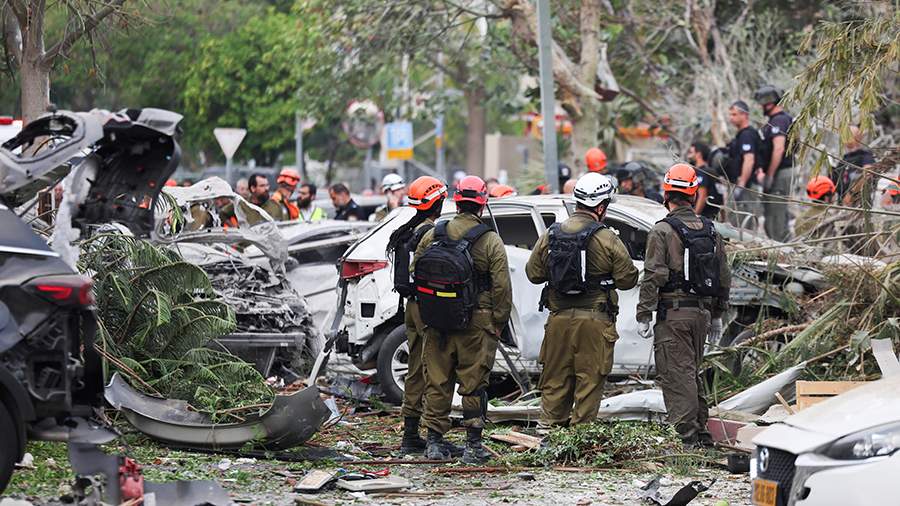Iran retaliated against Israel. What you need to know

On the evening of June 13, as part of the large-scale Operation True Promise 3, the Iranian Armed Forces launched the first wave of retaliatory strikes against military targets in Israel. Soon it became known about the launch of the second wave of ballistic missiles. On the night of June 14, the Israel Defense Forces (IDF) announced a third wave of missile attacks from Iran. By morning, Iran had attacked Israeli territory for the fourth time. What you need to know about Tehran's mirror measures is in the Izvestia article.
"True Promise 3": what is known about the operation
Iran's Supreme leader Ali Khamenei has promised a "tough response" to Operation Rising Lion announced by Israeli Prime Minister Benjamin Netanyahu. The President of the Islamic Republic, Masoud Peseshkian, also warned of a "powerful retaliatory strike." At the same time, Khamenei called the Israeli attack a "big mistake" and said he was rejecting the idea of compromise with Israel. Thus, the operation with the symbolic name "True Promise 3", which was announced by the Iranian Islamic Revolutionary Guard Corps (IRGC), became a mirror measure to Israeli strikes.
"The armed forces of the Islamic Republic of Iran have launched a wave of retaliatory strikes against Israel following the Israeli regime's strikes on Iranian territory," the IRGC said in a statement.
Iran's mirror attack on Israel: consequences and victims
According to the Israeli N12 TV channel, Iran fired about a hundred missiles in the first salvo and about 50 more in the second wave. As a result, several rocket attacks hit the building of the Israeli Ministry of National Security, the IRNA news agency said. Soon, the Iranian IRIB television and radio company announced that Iran had carried out a third wave of retaliatory attacks on Israeli territory, during which, according to the IRGC, missile production centers as well as military industry facilities of the Jewish state were hit.
"During this operation, missile and unmanned units of the IRGC Aerospace Forces, using a combination of point and intelligent systems, attacked military centers and air bases, as well as military-industrial centers," the IRGC stressed.
In addition, the Israeli portal Ynet reported that 63 people were injured as a result of Iran's retaliatory measures during the launch of the first and third waves. Previously, 14 people were injured due to rocket attacks in the fourth salvo. Also, about 300 Israeli residents were evacuated from the city of Ramat Gan to aid centers, N12 reports. And many Israelis and visitors to the country were forced to hide from rocket attacks in bomb shelters.
The reaction of the world community
At the initiative of Iran, an emergency meeting of the UN Security Council was held in connection with the Israeli attack. Russia's permanent representative to the UN, Vasily Nebenzia, in turn, said that a dangerous escalation in the Middle East is taking place due to the actions of Tel Aviv. As the Russian diplomat pointed out, the IDF strike contributed to the impetus for a "large-scale nuclear war" in the region.
"This unprovoked attack, no matter how Israel claims otherwise, is a gross violation of the UN Charter and international law," Nebenzia stressed.
The head of the European Commission (EC) Ursula von der Leyen supported Israel: according to her, during the escalation of the conflict in the Middle East, Israel has the right to "defend itself and its people." She made the corresponding statement despite the fact that the Jewish state was the first to launch an attack on the other side of the conflict, Iran. At the same time, von der Leyen stressed the importance of maintaining regional stability and called for preventing escalation through diplomatic efforts.
UN Secretary General Antonio Guterres demanded an end to the escalation of the conflict from both Israel and Iran, condemning both the Israeli bombing and rocket attacks on Tel Aviv. He stressed that peace and diplomacy "must prevail."
Venezuelan President Nicolas Maduro called for an end to the aggression of the Israeli people against Iran, condemning the actions of Israeli Prime Minister Benjamin Netanyahu. The head of state even compared the military operation of the Jewish state to Nazism. In addition, he expressed disappointment with the position of Western countries and stressed that only a multipolar world based on a dialogue of civilizations and respect for international law can stop the threat of a new world war.
Expert opinion
There are staged elements in the escalation between the parties to the conflict, Stanislav Tarasov, Candidate of Historical Sciences and political scientist, told Izvestia. As the expert noted, the Israeli strike took place after the completion of the fifth round and on the eve of the sixth round of negotiations between the United States and Iran on the nuclear deal.
Prior to this, American leader Donald Trump had warned of the threat of attacks on Iran's nuclear infrastructure. The Islamic Republic, in turn, reported on the adoption of countermeasures against such attempts.
"There are a lot of staged elements in the current armed—type confrontation between Israel and Iran. <...> That is, everything was expected," says the political scientist.
Iran's retaliatory strikes on Israeli territory are reconnaissance before the battle, said analyst and former American intelligence officer Scott Ritter. According to him, this is an attack aimed at "probing the enemy." Ritter believes that the Islamic Republic can deprive Israel of electricity, attack airfields and attack high-ranking military personnel.
Переведено сервисом «Яндекс Переводчик»



